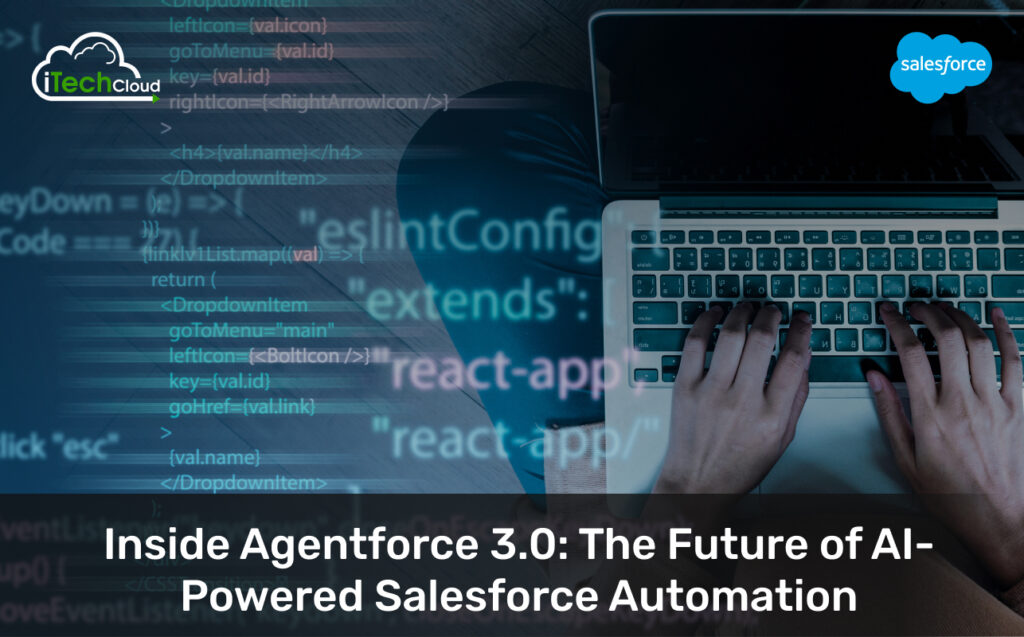Inside Agentforce 3.0: The Future of AI-Powered Salesforce Automation

Introduction
The world of customer relationship management (CRM) is evolving at an unprecedented pace, driven by artificial intelligence (AI) and automation. Salesforce, a leader in CRM solutions, continues to push boundaries with innovations that empower businesses to enhance productivity, improve customer engagement, and drive revenue growth. One of the most exciting developments in this space is Agentforce 3.0, a next-generation AI-powered automation platform designed to revolutionize how sales teams operate.
Table of Contents
1. What is Agentforce 3.0?
Agentforce 3.0 is an advanced AI-driven automation platform built on Salesforce, designed to streamline sales processes, enhance agent productivity, and improve customer interactions. Unlike traditional CRM tools that rely heavily on manual input, Agentforce 3.0 leverages machine learning (ML), natural language processing (NLP), and predictive analytics to automate repetitive tasks, generate insights, and optimize sales workflows.
Evolution from Previous Versions
- Agentforce 1.0: Basic automation, rule-based workflows.
- Agentforce 2.0: Introduced AI for lead scoring and basic recommendations.
- Agentforce 3.0: Full AI integration, autonomous decision-making, and deep learning capabilities.
This latest version represents a quantum leap in sales automation, enabling businesses to operate with unprecedented efficiency.
2. Key Features & AI Capabilities
Agentforce 3.0 is packed with cutting-edge features that redefine sales automation:
A. AI-Powered Lead Scoring & Prioritization
- Uses predictive analytics to rank leads based on conversion likelihood.
- Considers historical data, buyer behavior, and market trends.
- Helps sales teams focus on high-value prospects.
B. Smart Email & Chat Automation
- Natural Language Generation (NLG) crafts personalized emails.
- AI chatbots handle routine customer queries, freeing agents for complex tasks.
- Sentiment analysis detects customer emotions for better engagement.
C. Automated Follow-Ups & Task Management
- Schedules follow-ups based on customer interaction patterns.
- Integrates with calendars and CRM to auto-assign tasks.
D. Real-Time Sales Coaching
- AI analyzes calls and meetings to provide instant feedback to agents.
- Suggests best practices, objection-handling techniques, and closing strategies.
E. Dynamic Pricing & Deal Optimization
- Recommends optimal pricing based on competitor analysis and customer history.
- Predicts deal success and suggests negotiation tactics.
F. Salesforce Integration
- Works natively within Salesforce, enhancing existing workflows.
- Syncs with Marketing Cloud, Service Cloud, and Einstein AI.
3. How Agentforce 3.0 Transforms Salesforce Automation
Traditional sales automation tools follow predefined rules, but Agentforce 3.0 learns and adapts in real time. Here’s how it changes the game:
A. Reducing Manual Work
- Automates data entry, follow-ups, and reporting.
- Agents spend more time selling and less on admin tasks.
B. Personalization at Scale
- AI tailors interactions based on customer preferences.
- Delivers hyper-personalized recommendations and offers.
C. Improving Sales Forecasting Accuracy
- Predictive models analyze trends to forecast revenue more precisely.
- Reduces guesswork in pipeline management.
D. Boosting Agent Performance
- Real-time coaching helps underperforming agents improve.
- Top performers get AI-driven insights to refine strategies.
E. Accelerating Sales Cycles
- Identifies bottlenecks and suggests optimizations.
- Shortens deal closure time with automated nudges.
4. Real-World Use Cases & Benefits
A. Enterprise Sales Teams
- Benefit: Handles large deal pipelines efficiently.
- Use Case: A Fortune 500 company reduced follow-up time by 40% using AI automation.
B. Small & Medium Businesses (SMBs)
- Benefit: Levels the playing field with enterprise-grade AI.
- Use Case: A mid-sized SaaS firm increased conversions by 25% with smart lead scoring.
C. Inside Sales & Remote Teams
- Benefit: Remote collaboration with AI-driven insights.
- Use Case: A remote sales team improved call efficiency by 30% using real-time coaching.
D. Customer Support & Upselling
- Benefit: AI identifies upsell opportunities from support tickets.
- Use Case: An e-commerce brand grew revenue by 15% through automated cross-selling.
5. The Future of AI in Sales Automation
Agentforce 3.0 is just the beginning. The future holds even more advancements:
A. Autonomous Sales Agents
- AI could handle entire sales cycles with minimal human intervention.
B. Voice & Conversational AI
- Voice-enabled AI assistants for hands-free sales management.
C. Blockchain for CRM Security
- Secure, transparent customer data handling.
D. Hyper-Personalized AI Avatars
- Virtual sales reps interacting with customers in real time.
6. Challenges & Considerations
While Agentforce 3.0 is powerful, businesses must consider
A. Data Privacy & Compliance
- AI follows GDPR, CCPA, and other regulations.
B. Integration Complexity
- Legacy systems may need upgrades for seamless AI adoption.
C. Human-AI Collaboration
- Balancing automation with the human touch in sales.
7. My Takeaway: Is Agentforce 3.0 a Game-Changer?
Agentforce 3.0 marks a transformative leap in Salesforce automation, seamlessly blending AI with productivity tools like Command Center, Multi-Channel Processing (MCP), and App extensibility. With its smart agent orchestration, scalable automation, and unified interface, it sets a new standard for CRM intelligence. As businesses demand faster, smarter, and more personalized customer engagement, Agentforce 3.0 positions Salesforce users at the forefront of this AI revolution enabling future-ready workflows and redefining what’s possible in enterprise automation.

